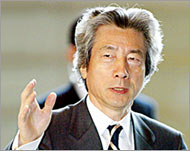Japan: Families tense, but hopeful
As she sits down, Ayako Inoue makes the mistake of looking at the two photographs that she is holding.

In one, her sister, Nahoko Takato, in a colourful scarf smiling into the camera. In the second, she is surrounded by a mob of smiling street children on an earlier aid mission to Baghdad.
Without warning, Ayako’s face dissolves into tears, she stands up and walks away from the relatives of the other Japanese being held hostage in Iraq.
In a stark meeting room at the Tokyo office of the Hokkaido Prefectural Government, where two of the three hostages are from, she struggles for a minute or two before getting her emotions under control.
“I’m very sorry,” she tells me, dropping her eyes. “It is the first time that I have looked at a picture of my sister since she was taken hostage.”
Conflicting indications
The three are reportedly being held by a previously unknown group called Saraya al-Mujahideen.
For more than a week, the families of Nahoko Takato, 34, Noriaki Imai, 18, and Soichiro Koriyama, 32, have struggled to come to terms with the conflicting indications from the Middle East that have at times offered hope rather than despair.
The hostage-takers have threatened to kill the three unless the Japanese government withdraws its Self-Defence Forces from southern Iraq; Tokyo has refused point blank to even consider the question.
The strain on the families is clearly beginning to tell.
 |
|
Relatives of the three hostages |
Kimiki Koriyama, the mother of Soichiro, a freelance photojournalist, is visibly tired. Takashi, the father of Imai, is quiet and deep in thought for much of the interview. His wife, Naoko, speaks quietly and earnestly, but by the end she is dabbing a handkerchief beneath her eyes.
“We’re not getting much sleep but we are making a big effort now to eat and drink properly,” Inoue says.
“Some of us were taken ill yesterday so we’re making a conscious effort to look after ourselves because if I collapse that will just cause more problems for the people around me,” he adds.
“Even when I do go to sleep, I put my mobile phone on the pillow beside me and hope that if it rings it will be good news,” says Koriyama.
“We have received lots of messages of support from the volunteer workers and even when I feel tired, that gives me energy.” Volunteer doctors and counsellors are on hand.
In a neighbouring room, a small television constantly monitors the news programmes for the latest snippets of information.
Estimate
The families agree that not knowing what might be happening to their relatives is the worst thing.
They estimate that they get one-third of their information from the media, one-third from contacts on the ground in the Middle East and the remainder from the Japanese government.
 |
|
Koizumi has refused to meet |
They attended a situation briefing with government officials on Tuesday evening but cannot reveal what was discussed. Moreover, they have distanced themselves from criticism of the way in which the administration of Prime Minister Junichiro Koizumi is handling this crisis. Koizumi has refused to meet the family members.
“We have faith in the government and the cooperation of the government is essential to us,” is as far as Inoue will be drawn.
“We’re getting so much information and it’s like a roller-coaster, good-bad-good-bad,” she says.
“It’s like we’re experiencing waves of information but we’re trying to keep those waves as small as possible and, whether the information is reliable or not, we just want to have as much as possible.
“But most of all, and this applies to all of us, we want concrete proof that our loved ones are still alive,” she says.
“My brother and the others went to Iraq because they believed they could do something to help the people of the country,” says Yosuke Imai, the older brother of Noriaki. “They did not go there with bad intent and we want to emphasise that they wanted to help.”
Optimistic
“We are very sorry to hear the news of what is going on in Iraq and we are sure, the three captives, are all hoping for a peaceful resolution to this situation,” he says, adding that the families are broadly optimistic that the three will be released unharmed.
|
“Even when I do go to sleep, I put my mobile phone on the pillow beside me and hope that if it rings it will be good news” Kimiki Koriyama, |
“The news seems to be more good than bad recently and we don’t know whether that’s accurate, but we’re generally more hopeful,” he says.
The families are also grateful for the assistance of Iraqi people in trying to arrange the release of the three, with a friend of Takato producing a video featuring the homeless children of Baghdad that she was on her way to help, hoping that this will help in her release.
“The people of Iraq are also very worried about our family members and the three of them should feel grateful for the support of the Iraqis when they are released,” said Yosuke Imai.
And, in their more optimistic moments, the families are planning what they will say when they are reunited.
“I’m going to tell him that he received so much support from so many people and caused so much trouble that I want him to think deeply about what everyone has done for him and live the rest of his life in consideration of that,” said Mrs Imai. “I will say that he has many new friends in lots of countries and he must live with hope.”